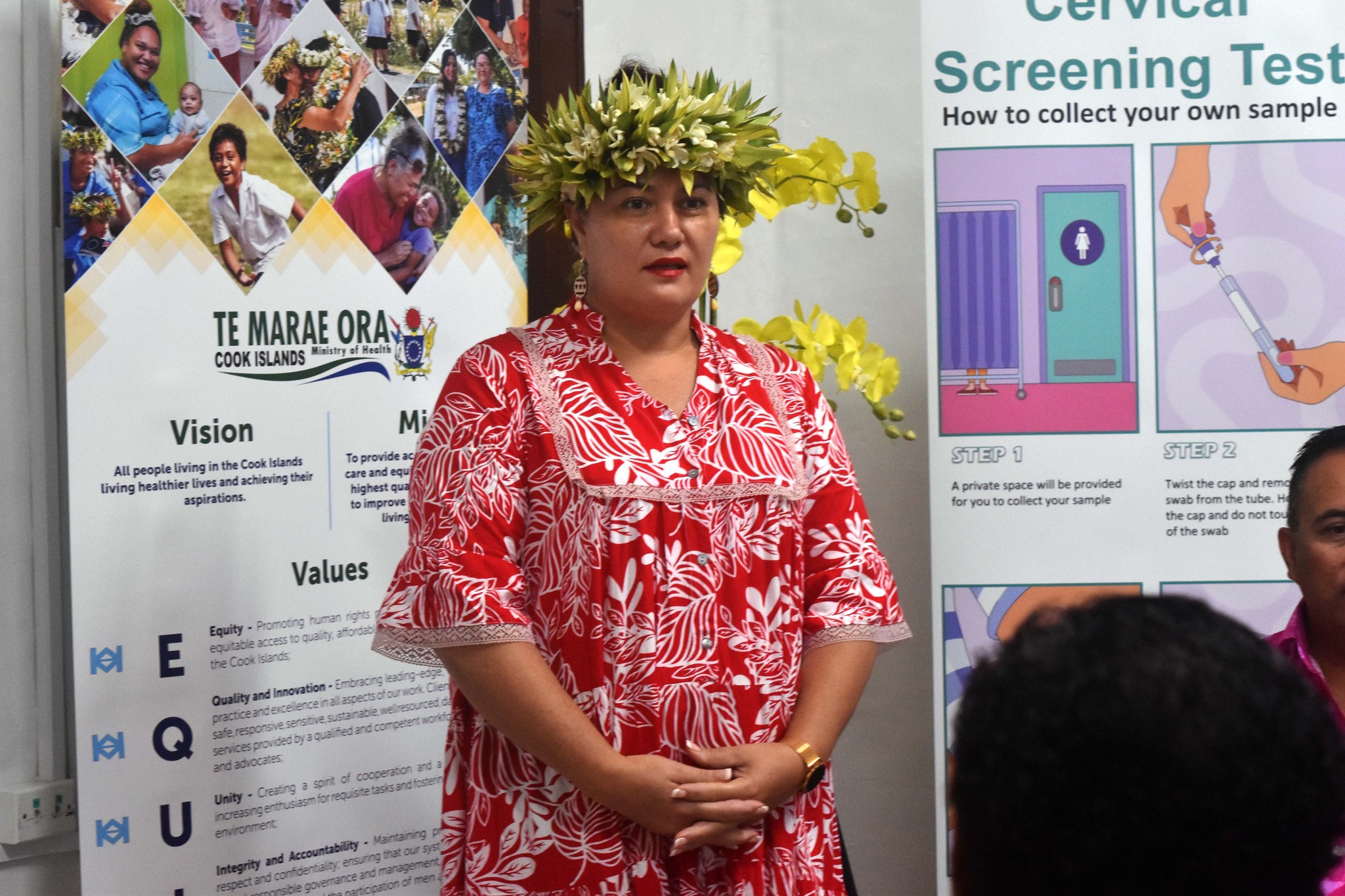Cervical cancer self-testing returns ‘low high-risk’ HPV
Tuesday 16 April 2024 | Written by Melina Etches | Published in Health, National

Minister for Health Rose Vainetutai Toki-Brown during the launch of Cervical Cancer Self-Testing Programme in December last year. TMO/23122025
The pilot self-testing programme for cervical cancer showed a low rate of high-risk HPV and good uptake, especially among women who hadn’t had a Pap smear in a long time.
From 287 samples of Te Marae Ora Ministry of Health pilot run of the Cervical Cancer Self-Testing Programme, only 1 per cent were positive for the high-risk HPV (Human Papilloma Virus) type. Their colposcopy results are still pending.
Of the 393 samples that were collected during the six-week programme run from January 15 to February 25 this year, 287 were processed for analysis.
From these samples, 10 per cent have returned positive for “other oncogenic HPV types”.
Dr Hannah Cummings, Te Marae Ora house officer, explained that the “high-risk” genetic strain HPV types screened via self-HPV tests and cervical Pap smears are 16, 18, and 45 for cervical cancer.
The other 10 per cent of positive tests were for “other oncogenic HPV types”, which are considered lower risk factors for cervical cancer. In these cases, the next step is typically a follow-up cervical Pap smear to check for cell changes in the cervix.
Any results that do return positive for cervical cancer would immediately be discussed appropriately with the patient for urgent referral to Aotearoa New Zealand for further treatment, she added.
Dr Cummings said the outcome of the screenings had been encouraging with a low percentage of HPV positive, especially with only 1 per cent high-risk type with an adequate sample size.
“This is reassuring in a sense that we did anticipate possibly identifying more HPV-positive cases since the uptake was mild-moderate in the past two years, especially during the Covid pandemic,” said Dr Cummings.
“Even more reassuring is that the majority of the women screened were well overdue for cervical screening (5-10 years) and for some, it was their very first screening (aged 30s-50s).
“We hope that the self-HPV method will boost the uptake of cervical screening from currently 55 per cent to the WHO (World Health Organisation) standard goal of 80 per cent.
“We can also appreciate that these results are reflective of the high uptake of the HPV vaccination rate - 95-99 per cent in the Cook Islands.”
The samples were processed in Victoria, Australia, by the Victorian Cytology Service (VCS) pathology laboratory. They were sent in batches of 100-150 at a time to comply with the laboratory rules for sending specimens.
Taking a step further into improving women’s health in the Cook Islands, Te Marae Ora launched the programme in partnership with the Cook Islands Family Welfare Association (CIFWA) in January 2024.
This cervical screening for women aged 25 and over was made possible by a donation of 500 self-test kits from the Victorian Cytology Service (VCS) Foundation Australia.
Te Marae Ora is working closely with the Cook Islands Family Welfare Association to create roll-out plans for the Pa Enua.
Aitutaki will be the first island that will undertake this screening programme next month in mid-May and will span throughout the southern islands.
Te Marae Ora will continue to collaborate with CIFWA to organise outreach screening programmes on Rarotonga. Large companies and businesses interested in offering screening opportunities to their employees can contact CIFWA or TMO to arrange a programme.
Dr Cummings would like to acknowledge all the participants for being forthcoming in doing their self-testing.
She would like to thank the managerial support – Minister for Health Rose Vainetutai Toki-Brown, Secretary for Health Bob Williams, Acting Director of Health Dr. Deacon Teapa, Chief Nursing Officer Ngatamariki Manea, and the partnership with Australia – Professor Marion Seville (self HPV testing lead for Australia), VCS laboratory and CANSCREEN digital health team.
Dr Cummings also acknowledged the small team on the clinical grounds – Angelina Noema, Dean Kapi-Tangata, OBGYN consultant Dr Kevin Bisilli, Theresa Tatuava - Laboratory Scientist and the support of the ICT team (Etua, Shaun and Mary), receptionist team and communications team (Howard and Michaela).




































